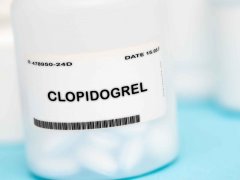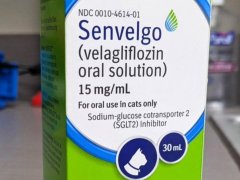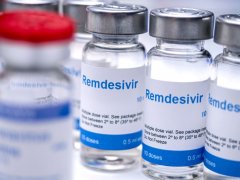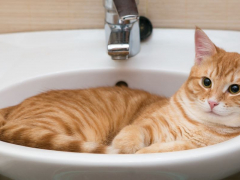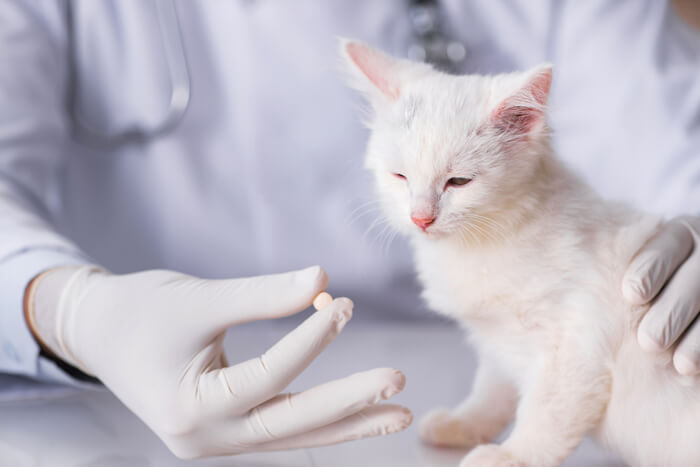
Albon is a brand name for the generic medication sulfadimethoxine, which is commonly used to treat the intestinal parasite condition coccidiosis in cats. In this article, you’ll learn how Albon works, when and how it’s used, common side effects, and some frequently asked questions.
Albon For Cats Overview

About Albon for Cats
Albon is a brand name for sulfadimethoxine, which is a sulfonamide antimicrobial agent.
Albon is most commonly used to treat gastrointestinal infections caused by the coccidia parasite group Isospora. Isospora are not worms, but single-celled microscopic protozoal organisms.
While sulfonamide antibiotics can be used to treat certain bacterial infections, sulfadimethoxine itself is not commonly used for this purpose in veterinary medicine.
What Does Albon Do for Cats?
Sulfonamides like sulfadimethoxine work by interfering with the synthesis of folic acid, or vitamin B9. Microorganisms that don’t produce their own folic acid are unaffected by sulfonamides.
When used against infections caused by the coccidian group Isospora, Albon is typically effective at eliminating the parasite.
Isospora can be common intestinal parasites, especially in young kittens, and can cause severe watery diarrhea, vomiting, abdominal pain, and dehydration. Kittens often acquire the parasites either from their mother who is a carrier, or from infected stool present in the environment. Some adult cats can be asymptomatic carriers of Isospora and while not showing signs of disease, can present a risk to pets with compromised immune systems, especially young kittens.
It’s very common to treat cats that have Isospora oocysts (eggs) in their stool samples, even if they are not showing signs of illness, as they can present a risk to other pets. Isospora is not a parasite infectious to humans.
Albon is a first choice for treating Isospora infections, because it is generally very effective and is inexpensive. Resistant Isospora infections that don’t resolve with Albon are fortunately rare, but do occur. In these cases there are other medications that can be used, but they are often more expensive or less practical to dose and administer.
Side Effects of Albon for Cats
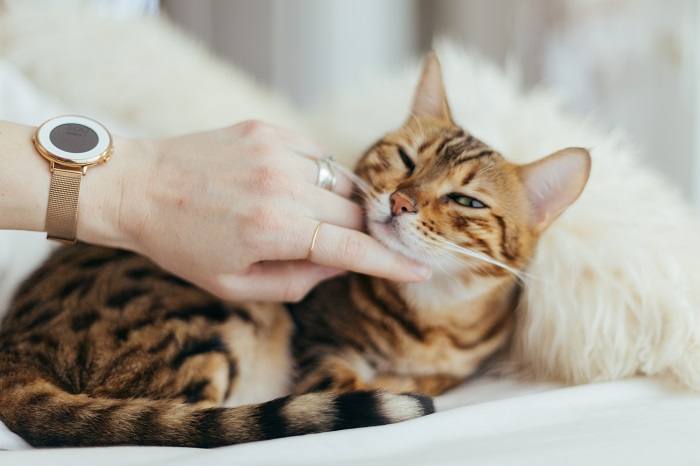
Hypersensitivity reactions can occur with any medication, but tend to be very rare for Albon use in cats.
Albon is generally well-tolerated by cats, though dosing the tablets or liquid can sometimes be a hassle as any cat parent experienced at medicating their kitty can tell you.
Side effects seen to Albon and sulfonamides in general, are more often reported in dogs. As it is an antibiotic, it can interfere with the normal gut flora, which can lead to diarrhea. However, in most pets being treated for diarrhea caused by coccidia, signs will improve, not worsen.
Hypersensitivity reactions can occur with any medication, but tend to be very rare for Albon use in cats. Some side effects seen with sulfonamides occur more often at very high doses or when used for extended periods. In most cases, coccidia will resolve within a week or two of use, and any need for extended use is very rare.
Albon for Cats Dosage
The FDA labeled dosage for Albon is 55 milligrams per kilogram on day one, followed by half that dose at 27.5 milligrams per kilogram once daily.
The length of time for treatment depends on clinical response, so it is very important to follow your veterinarian’s instructions when using Albon. It can be common to treat for anywhere from 5 to 10 days with extended treatments beyond that being uncommon.
If a kitty was started on Albon because Isospora oocysts were found in a stool sample, it is very common for a veterinarian to request that a stool sample be rechecked a couple of weeks later to ensure the treatment was successful.
Albon comes in two common oral dosage forms. The 50mg/ml oral suspension is FDA approved for cats and is most commonly the form given to kitties and especially small kittens.
The tablets are also FDA approved for cats and can be used for older juvenile and adult cats. Tablets are less commonly used for young kittens that may not yet have fully developed teeth or be able to prehend harder foods where a liquid medication is far easier to administer.
Conclusion
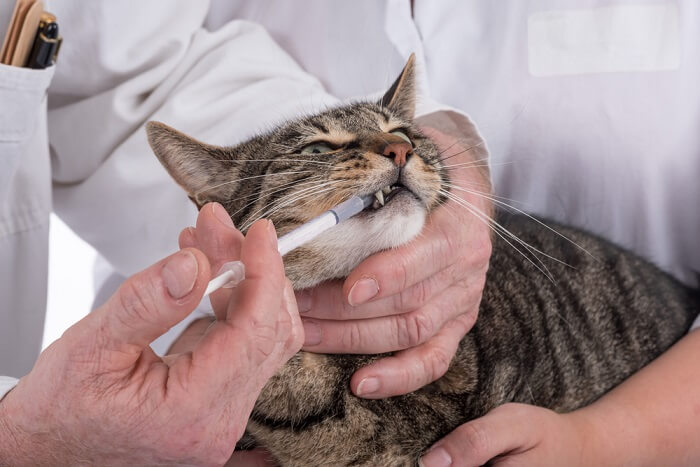
The length of time for treatment depends on clinical response, and it is common to treat for anywhere from 5 to 10 days with extended treatments beyond that being uncommon.
Albon, or sulfadimethoxine, is commonly used to treat Isospora, a group of protozoal coccidia parasites that cause intestinal infection in cats. It is inexpensive and generally effective, making it a favorable first choice for this parasite.
While it is a sulfonamide antibiotic, Albon itself is not commonly used in veterinary medicine for treatment of bacterial infections. It’s always important to discuss details with your veterinarian before using any medication for your cat.
Drug Dosing Disclaimer: We are only able to provide doses for medications that are FDA approved for use in cats and only as the label guidelines dictate. For medications that are used off-label we can only provide guidelines and safety information for use. Safe and appropriate dosing for off-label medications can only be determined by a primary care veterinarian.
We encourage you to work with your veterinarian to determine if a particular medication is appropriate for your cat. Changing or adjusting a dose for your cat on your own without consulting with a veterinarian can carry risk. We do not encourage use of medications prescribed for human use in pets without first consulting with a primary care veterinarian.
Frequently Asked Questions
Does Albon Help with Diarrhea?
Albon will only help with diarrhea if the diarrhea is being caused by an organism susceptible to it. In cats, it is most often used against Isospora, a group of protozoal coccidian organisms that can sometimes cause very bad watery diarrhea, especially in young kittens.
Is Albon Safe for Cats?
Albon is FDA approved for use in cats and side effects are uncommon when it’s used appropriately and as prescribed. While digestive upset can occur with any antimicrobial, some side effects seen in dogs, like keratoconjunctivitis sicca (dry eye), have not been reported in cats.
There are other side effects reported in dogs that have only been seen at very high or prolonged doses, and this type of dosing is very uncommonly needed when treating susceptible infections in cats.
How Much Albon Can I Give My Kitten?
The initial dose as labeled is 50mg/kg of body weight on day one, followed by half that dose at 27.5mg/kg once daily after that. The length of time Albon is prescribed can vary depending on response, but the treatment period is often from 5-10 days.
While it can be common practice among rescue groups and shelters to proactively treat young kittens for coccidia, it should never just be assumed that a kitten experiencing diarrhea has this parasite. There are many causes of diarrhea in kittens, and several different intestinal parasites that can cause disease.
Albon is only labeled for the treatment of Isospora organisms and is not effective against some other parasites like Giardia or intestinal worms. The best way to know what parasite may be affecting your kitten and causing diarrhea is to have your vet examine your little friend and have a fecal sample checked.
